Filter by
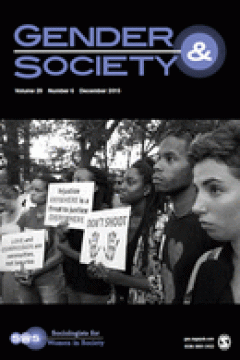
Same-Sex Marriage and the Future of the LGBT Movement SWS Presidential Address
In this article, I respond to queer critiques of the pursuit of same-sex marriage. I first examine the issue of (homo)normalization through a consideration of the everyday lives of same-sex couples with children, a subject about which queer critics are strangely silent. Children force same-sex couples to be out in multiple areas of their lives and recent court cases explicitly challenge the ide…
- Edition
- Volume 29, Issue 3 June 2015, pages 321-337
- ISBN/ISSN
- 0891-2432
- Collation
- -
- Series Title
- GENDER & SOCIETY
- Call Number
- -
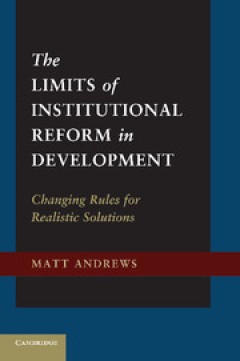
The Limits of Institutional Reform in Development: changing rules for realist…
Developing countries commonly adopt reforms to improve their governments yet they usually fail to produce more functional and effective governments. Andrews argues that reforms often fail to make governments better because they are introduced as signals to gain short-term support. These signals introduce unrealistic best practices that do not fit developing country contexts and are not consider…
- Edition
- -
- ISBN/ISSN
- 978-1-107-01633-0
- Collation
- xii, 254p.; 23 cm
- Series Title
- -
- Call Number
- 338.9 AND l

Police Mothers at Home: Police Work and Danger-Protection Parenting Practices
Studies of the challenges faced by women in policing have paid little attention to the specific experiences of policewomen who are mothers. Guided by critical theorizing on the gendered nature of the police culture and domestic labor, 16 police officer mothers in Ontario, Canada, were interviewed. Our qualitative analyses explore their experiences of the �lion�s share� of domestic labor; the or…
- Edition
- Volume 29, Issue 2 April 2015, pages 265-289
- ISBN/ISSN
- 0891-2432
- Collation
- -
- Series Title
- GENDER & SOCIETY
- Call Number
- -

Expertise and Sliding Scales Lactation Consultants, Doulas, and the Relation…
The combination of money and intimacy, particularly in the context of paid caring, can be difficult, given the tendency to view them as belonging to separate spheres. This research studied paid caring within the context of breastfeeding and labor support, using 72 interviews with lactation consultants, doulas, clients, and health care professionals, as well as 150 hours of ethnographic observat…
- Edition
- Volume 29, Issue 2 April 2015, pages 244-264
- ISBN/ISSN
- 0891-2432
- Collation
- -
- Series Title
- GENDER & SOCIETY
- Call Number
- -

The Glass Runway How Gender and Sexuality Shape the Spotlight in Fashion Design
Fashion design is a feminized occupation, but there is a widespread perception that gay male designers are advantaged in receiving awards, publicity, and praise. This article develops the notion of a �glass runway� to explain this inequality. First, using design canons and lists of award recipients, I show that men, especially gay men, receive more consecration than women. Second, I show how me…
- Edition
- Volume 29, Issue 2 April 2015, pages 219-243
- ISBN/ISSN
- 0891-2432
- Collation
- -
- Series Title
- GENDER & SOCIETY
- Call Number
- -

Feeling Labor Commercial Divination and Commodified Intimacy in Turkey
This article approaches commercial divination as a lens to examine the gendered contents and discontents of labor and intimacy in the neoliberal era. While coffee divinations have long been a feminized medium of socializing and caring in Turkey, they were recently transformed into a commodified service that recruits women, youth, and LGBTQ individuals as workers and consumers. In dialogue with …
- Edition
- Volume 29, Issue 2 April 2015, pages 195-218
- ISBN/ISSN
- 0891-2432
- Collation
- -
- Series Title
- GENDER & SOCIETY
- Call Number
- -

Purple-Collar Labor Transgender Workers and Queer Value at Global Call Cente…
This article examines new patterns of workplace inequality that emerge as transgender people are incorporated into the global labor market. Drawing on in-depth interviews with 41 transgender call center employees in the Philippines, I develop the concept �purple-collar labor� to describe how transgender workers�specifically trans women�are clustered, dispersed, and segregated in the workplace a…
- Edition
- Volume 29, Issue 2 April 2015, pages 169-194
- ISBN/ISSN
- 0891-2432
- Collation
- -
- Series Title
- GENDER & SOCIETY
- Call Number
- -

Islamic Traditions of Modernity Gender, Class, and Islam in a Transnational …
Women�s education has been central to discourses that have sought to modernize developing and Muslim societies. Based on ethnographic data collected from women teachers from rural and low-income communities of Pakistan, the article shows how being a parhi likhi (educated) woman implies acquiring a privileged subject position making claims to middle-class and Islamic morality, and engaging in sp…
- Edition
- Volume 29, Issue 1 February 2015 , pages 98-121
- ISBN/ISSN
- 0891-2432
- Collation
- -
- Series Title
- GENDER & SOCIETY
- Call Number
- -

Feminist Spirituality as Lived Religion How UK Feminists Forge Religio-spiri…
How do feminists in the United Kingdom view spirituality and religion? What are their religious and spiritual attitudes, beliefs, and practices? What role do spirituality and religion play in feminists� lives? This article presents findings from an interview-based study of 30 feminists in England, Scotland, and Wales. It identifies three characteristics of feminists� approaches to religion and …
- Edition
- Volume 29, Issue 1 February 2015 , pages 98-122
- ISBN/ISSN
- 0891-2432
- Collation
- -
- Series Title
- GENDER & SOCIETY
- Call Number
- -

Politics of Devoted Resistance Agency, Feminism, and Religion among Orthodox…
This study explores how religious women become legitimate actors in the public sphere and analyzes their agency�its meanings, capacities, and transformative aims. It presents a novel case study of Israeli Modern-Orthodox Agunah activists who engage in highly politicized collective feminist resistance as religious actors working for religious ends. Embedded in and activated by Orthodoxy, they ad…
- Edition
- Volume 29, Issue 1 February 2015 , pages 73-97
- ISBN/ISSN
- 0891-2432
- Collation
- -
- Series Title
- GENDER & SOCIETY
- Call Number
- -

Negotiating Gendered Religious Space The Particularities of Patriarchy in an…
Much research on women�s religious participation centers on their abilities to act within constricted institutional spaces. Drawing on five years of ethnographic fieldwork, this study analyzes how African American Muslim women use the mosque as a physical space to enact public performances of religious identity. By occupying, protecting, and appropriating spaces in the mosque for meaningfully g…
- Edition
- Volume 29, Issue 1 February 2015 , pages 51-72
- ISBN/ISSN
- 0891-2432
- Collation
- -
- Series Title
- GENDER & SOCIETY
- Call Number
- -

Grit, Guts, and Vanilla Beans: Godly Masculinity in the Ex-Gay Movement
Ex-gay ministries, like many evangelical groups, advocate traditional gender ideologies. But their discourses and practices generate masculine ideals that are quite distinct from hegemonic ones. I argue that rather than simply reproducing hegemonic masculinity, ex-gay ministries attempt to realize godly masculinity, an ideal that differs significantly from hegemonic masculinity and is explicitl…
- Edition
- Volume 29, Issue 1 February 2015 , pages 26-50
- ISBN/ISSN
- 0891-2432
- Collation
- -
- Series Title
- GENDER & SOCIETY
- Call Number
- -
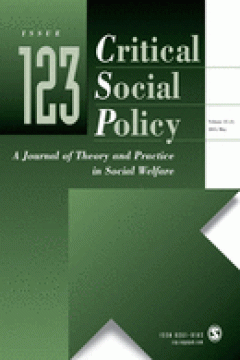
‘All you need is love and £18,600’: Class and the new UK family migratio…
In July 2012 the Conservative�Liberal Democrat Coalition government introduced a new set of family migration rules. These rules set a sharp increase in the minimum income threshold for people sponsoring partners and children to join them in the UK. Consequently, there has been a significant reduction in the number of visas granted through the family migration route. This article explores the th…
- Edition
- Volume 35, Issue 2 May 2015, pages 207-227
- ISBN/ISSN
- 0261-0183
- Collation
- -
- Series Title
- Critical Social Policy
- Call Number
- -

Street-level struggles against marketisation: A case study of nonprofits in a…
Many critical studies have warned that government�nonprofit partnership in welfare provision can lead to the marketisation of the nonprofit sector. However, this article contends that the adoption of market-like approaches does not necessarily result in the complete marketisation of the sector. Through a case study of Korean nonprofits engaged in a workfare scheme, this article reveals how nonp…
- Edition
- Volume 35, Issue 2 May 2015, pages 188-206
- ISBN/ISSN
- 0261-0183
- Collation
- -
- Series Title
- Critical Social Policy
- Call Number
- -

Brain science and early years policy: Hopeful ethos or ‘cruel optimism’?
Ideas that the quality of parental nurturing and attachment in the first years of a child�s life is formative, hard-wiring their brains for success or failure, are reflected in policy reports from across the political spectrum and in targeted services delivering early intervention. In this article we draw on our research into �Brain science and early intervention�, using reviews of key policy l…
- Edition
- Volume 35, Issue 2 May 2015, pages 167-187
- ISBN/ISSN
- 0261-0183
- Collation
- -
- Series Title
- Critical Social Policy
- Call Number
- -

Tottenham after the riots: The chimera of community and the property-led rege…
David Cameron�s �Big Society� agenda is best understood in terms of ideological and policy continuities with earlier Conservative and New Labour governments. But where previous post-1979 governments have sought to renegotiate the role of the state mostly through privatisations and marketisations of public services, the �Big Society� agenda also proposed the replacement of the state by individua…
- Edition
- -
- ISBN/ISSN
- 0261-0183
- Collation
- -
- Series Title
- Critical Social Policy
- Call Number
- -
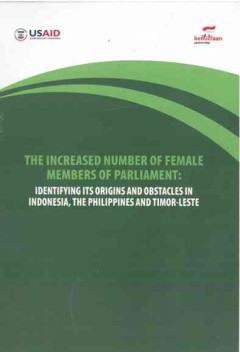
The Increased Number of Female Members of Parliament: identifying its origins…
- Edition
- -
- ISBN/ISSN
- 978-602-1616-09-3
- Collation
- x, 28p.; 30 cm
- Series Title
- -
- Call Number
- 324 VER i
- Edition
- -
- ISBN/ISSN
- 978-602-1616-09-3
- Collation
- x, 28p.; 30 cm
- Series Title
- -
- Call Number
- 324 VER i
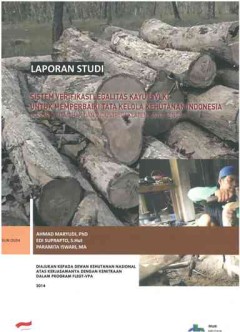
Sistem verifikasi legalitas kayu (SVLK) untuk memperbaiki tata kelola kehutan…
- Edition
- -
- ISBN/ISSN
- -
- Collation
- -
- Series Title
- -
- Call Number
- 333.7 MAR s
- Edition
- -
- ISBN/ISSN
- -
- Collation
- -
- Series Title
- -
- Call Number
- 333.7 MAR s

Kedudukan Hukum dan Peluang Pengakuan Surat Keterangan Tanah Adat
- Edition
- -
- ISBN/ISSN
- -
- Collation
- xi, 45p.; 30 cm
- Series Title
- -
- Call Number
- 333.31 SIM k
- Edition
- -
- ISBN/ISSN
- -
- Collation
- xi, 45p.; 30 cm
- Series Title
- -
- Call Number
- 333.31 SIM k
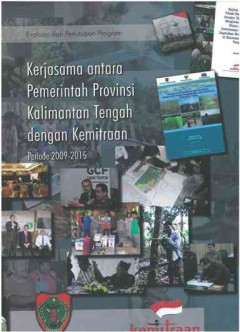
Kerjasama antara Pemerintah Provinsi Kalimantan Tengah dengan Kemitraan perio…
- Edition
- -
- ISBN/ISSN
- -
- Collation
- ix, 72p.; 30 cm
- Series Title
- -
- Call Number
- 333.7 KEM k
- Edition
- -
- ISBN/ISSN
- -
- Collation
- ix, 72p.; 30 cm
- Series Title
- -
- Call Number
- 333.7 KEM k
 Computer Science, Information & General Works
Computer Science, Information & General Works  Philosophy & Psychology
Philosophy & Psychology  Religion
Religion  Social Sciences
Social Sciences  Language
Language  Pure Science
Pure Science  Applied Sciences
Applied Sciences  Art & Recreation
Art & Recreation  Literature
Literature  History & Geography
History & Geography